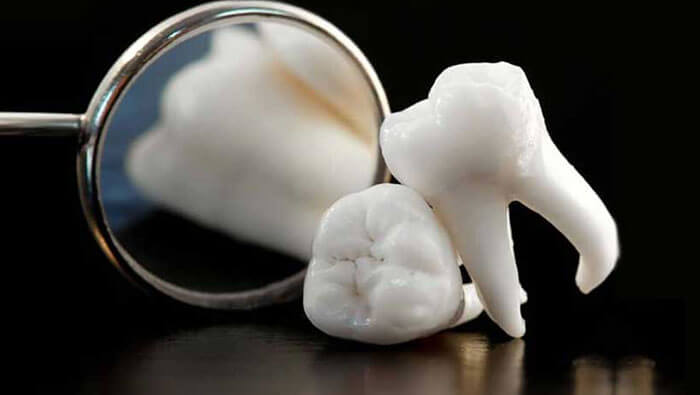There is an old saying that says, “With age comes wisdom.” While this often refers to knowledge, it is also true when we talk about your teeth. Unlike the 28 other teeth in your mouth, wisdom teeth are a little different and they develop with age. But what does that difference mean and what really are wisdom teeth? Why do you often hear about wisdom teeth pain symptoms and what causes it? How do you know if the pain you experience is from your wisdom teeth?
Here we will take a closer look at wisdom teeth and what pain symptoms really mean.

Key Takeaways
- Wisdom teeth are the third molars that develop in late teens or early twenties.
- Wisdom teeth often cause pain and complications due to lack of space in modern jaws.
- Pain, swelling, stiff jaw, gum disease, cysts, and sinus pressure can be symptoms of wisdom teeth problems.
- Dentists monitor wisdom teeth development from age 16 and may recommend removal before eruption.
- Removal is often easier and faster for younger patients, and immediate removal may be recommended if symptoms occur.
What are wisdom teeth?
All your teeth develop before you are even born, with the exception of your wisdom teeth. During fetal development, tooth buds form for both your primary (baby) teeth as well as your permanent teeth. They do not erupt, or break through the gums, until after birth. However, wisdom teeth do not begin to develop until around age seven and do not erupt until your late teens or early twenties.
Known as the third molars, wisdom teeth erupt at the back of the jaw, behind your second molars. Unfortunately, in many cases, there is not enough room in the jaw for wisdom teeth to come through without complications. So why does your body even make these unnecessary teeth? The answer is unknown, but researchers speculate it has to do with the primitive human diet.
A prehistoric human diet was much more abrasive on teeth, often causing damage to the first or second molars. Researchers believe that wisdom teeth provided late replacement teeth when molars wore out. There is also evidence that prehistoric humans had larger jaws provided more room for these additional teeth.
With softer diets and smaller jaws, wisdom teeth are no longer essential and, in many cases, can contribute to pain, infections, and gum disease when they erupt.
What causes wisdom teeth pain?
When you understand that modern jaws do not have room for additional teeth, it is easier to understand why wisdom teeth eruption can contribute to pain and complications. There simply isn’t enough room and additional teeth trying to push through can lead to:
- Wisdom teeth coming in crooked due to a lack of space and pressure from neighboring teeth.
- Inability to erupt through the gums, known as impacted wisdom teeth. Wisdom teeth become trapped underneath the gums and can lead to severe pain and infection.
- Bacterial infections. If your wisdom teeth partially erupt, bacteria can easily enter the opening and lead to a serious infection that can spread throughout the body.
- Additional pressure on the nerves and bones of the jaw.
While most associated with general pain, wisdom teeth can contribute to other painful complications. Symptoms from wisdom teeth can develop gradually or come on suddenly. These symptoms can include:
- Pain – One of the most common symptoms associated with wisdom teeth is pain. Pain can occur from pressure against other teeth as the wisdom tooth tries to erupt. Pain is also common with infection. You feel wisdom tooth pain at the site of the wisdom tooth and in the jaw. You may experience continual pain or only have pain when you open your mouth or chew.
- Swelling and Inflammation – Wisdom teeth coming in can contribute to swelling and irritation of the gums and surrounding tissue. You may experience tender and bleeding gums. If infection occurs, you may experience pus and fever. You may notice that the lymph glands under your jaw are swollen or sore.
- Stiff and Sore Jaw – As your wisdom teeth erupt, or try to erupt, they push against your other teeth and cause swelling of the gums. When this occurs, the added pressure can cause stiffness and pain in the jaw, making it difficult to open your mouth, chew, and talk.
- Gum Disease and Cavities – Because most people do not have enough room for wisdom teeth, an eruption can cause overcrowding and make brushing your teeth difficult. This can contribute to tooth decay, cavities, and gum disease.
- Cysts and Tumors – If left untreated, cysts and benign tumors can occur. While the tumors themselves are harmless, they can contribute to an infection and the destruction of the jawbone.
- Sinus Pressure and Pain – If you suffer from regular sinus pain, sinus pressure or sinus headaches, your wisdom teeth may be the culprit. The roots of growing wisdom teeth can push against the sinus cavity, resulting in sinus complications.

When to have wisdom teeth removed?
Deciding if or when to have wisdom teeth removed depends on many factors and is something you should discuss with your dentist. While some people experience no problems with their wisdom teeth, that is not usually the case. Dentists typically begin monitoring wisdom teeth development around the age of 16. While you may not experience any symptoms at this point, your dentist or oral surgeon may recommend removal before an eruption. Many dentists and oral surgeons believe removal before the age of 20 makes the procedure easier as the roots and bones have not fully developed. In addition, younger patients tend to recover from the procedure faster and with fewer complications.
If oral surgery and wisdom tooth removal do not occur when you are in your teens, regular dental visits allow for regular monitoring before symptoms occur. However, if you experience any of the common symptoms, your dentist will likely recommend removal immediately.
What should you do about your wisdom teeth?
While our ancient ancestors likely needed wisdom teeth, they are not necessary today. In many cases, if left untreated, wisdom teeth can cause pain and dental complications. If you are in your late teens or early twenties, visit your dentist to discuss your wisdom teeth and possible removal before symptoms or complications occur.
If you are already experiencing wisdom teeth symptoms, schedule an appointment with Soundview Family Dental today and we can discuss wisdom tooth removal and help keep your smile at its best.


